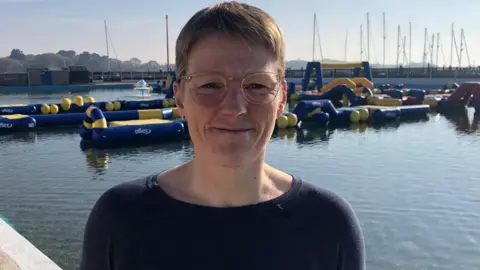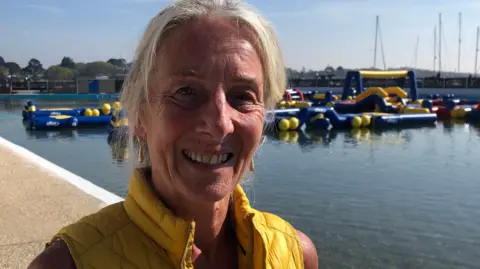Swimmers sought for cold water study on depression
 BBC
BBCSwimmers are being sought to take part in a study aimed to determine if cold water swimming can help treat depression and anxiety.
University of Portsmouth academics are following a similar trial last year with an appeal for 480 swimmers to take part in a trial outdoor swimming project at sites including Shoreham in West Sussex and Christchurch in Dorset.
Dr Heather Massey, senior lecturer in sport, health and exercise science, said the study aimed to provide "definitive evidence" of the positive impact of cold water on mental health.
It is hoped the study could help determine future treatments for depression and anxiety.

Cold water swimming experienced a boom during the Covid-19 pandemic, with sea and lido swimming providing a means of exercise during lockdowns.
Despite similar studies into its effects on mental health in the past, the Portsmouth researchers want to take a larger sample pool to achieve more scientific results.
They want to see what cold water swimming and cold-water immersion does to patients who suffer from depression and anxiety.
During the study, one group of volunteers would take part in an eight-week swim course, as well as maintaining their current medication plan.
The second would be a controlled group, where participants would continue taking their current treatment for depression and anxiety, and then take the swim course at the end.

Lynne MacFarlane, from the New Forest in Hampshire, was referred to the course because of depression but admitted she was "quite cynical about it" at first "because being a swimmer, I know I love the water, I love the sea".
She added: "I couldn't see how the cold would help my symptoms of depression but it did."
Dr Massey said there was "lots of information out there" on water's positive impact on mental health.
"What we don't have is definitive evidence to say that is the case," she continued.
"This is why we should be doing this type of work, to have that greater level of understanding about what is happening to people's symptoms of depression and who it helps to impact."
Nina Yates, an open water swim coach at Lymington Sea Baths, said she had "seen the benefits" from swimming in open water.
She added: "You get this buzz. It's all about making people feel comfortable."
It is hoped that the two-year study could help determine future treatments for depression and anxiety and even get cold water therapy prescribed by GP surgeries.
Outside 2 has been set up by the University of Portsmouth and Sussex Partnership NHS Trust, with funding by the National Institute for Health and Care Research.
It needs 480 volunteers who experience mild to moderate depression and will take place at 15 sites across England, including Lymington, Shoreham in West Sussex, Maidenhead in Berkshire and Christchurch in Dorset.
You can follow BBC Hampshire & Isle of Wight on Facebook, X (Twitter), or Instagram.
